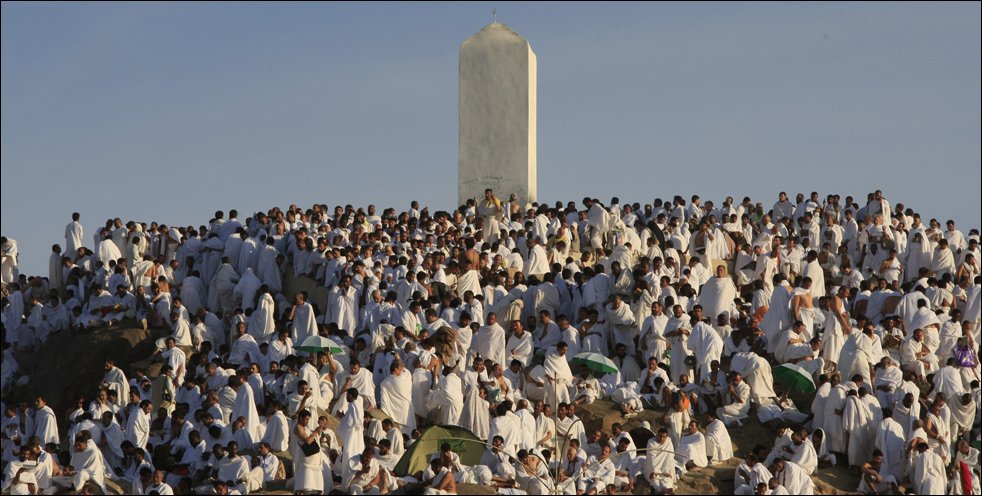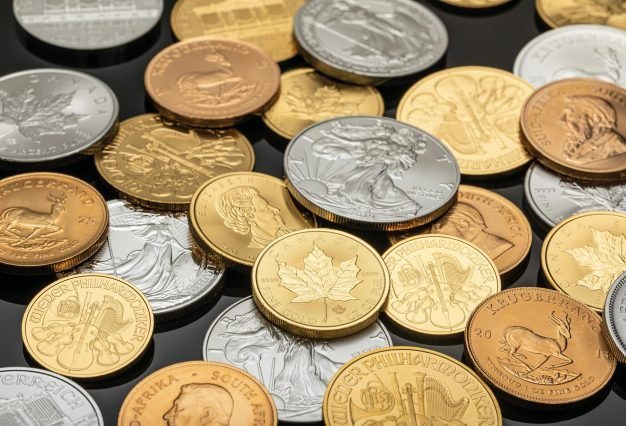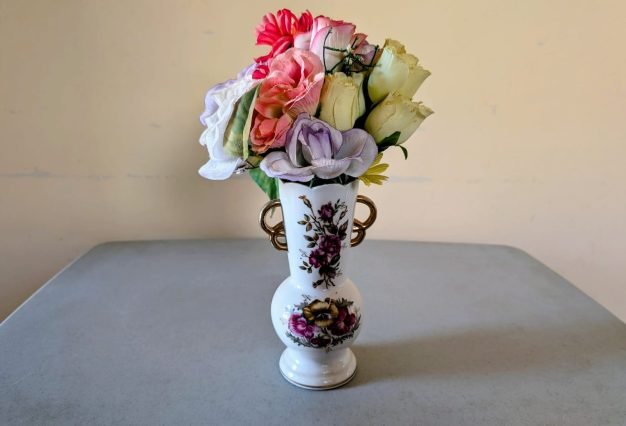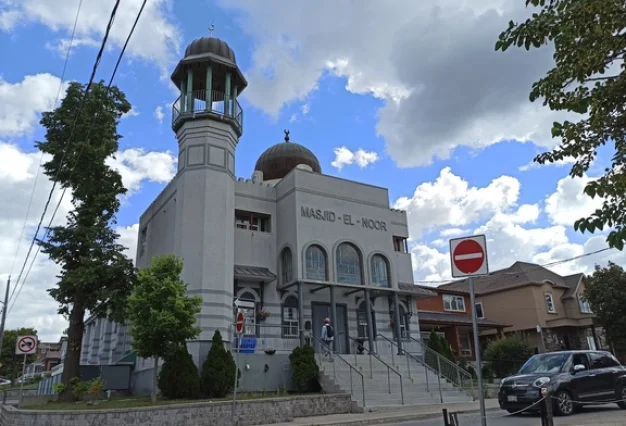Adapted from Ṣaḥīḥ Muslim
Introduction
“We went to Jābir bin ʿAbd Allāh (may God be pleased with him), the famous disciple of the Prophet (peace and blessings upon him). He began inquiring about the people [who had come to see him] until it was my turn. I said, “I am Muḥammad son of ʿAlī son of Ḥusayn.” He placed his hand upon my head and chest [in order to bless me]. During those days, I was a young lad. He said, “You are welcome here, my nephew. Ask whatever you would like to ask.” I asked a few things and then the time for prayer came. He stood up covering himself in his cloak. He led us in the prayer. Our conversation continued afterwards.”
Departure
“I said to him, “Tell me about the Ḥajj of God’s Messenger (peace and blessings upon him).” He indicated with his hand, the number nine. He then stated, “The Messenger of God stayed
in Madīnah for nine years but did not perform Ḥajj. He then made a public announcement in the tenth year to the effect that he was about to perform the Ḥajj. A large number of persons came to Madīnah. All of them were anxious to join the Messenger of God in pilgrimage.”
Iḥrām
“We set out with him until we reached Dhū al-Ḥulayfa. Asmaʿ daughter of ʿUmays gave birth to Muḥammad son of Abū Bakr on the journey. She sent a message to the Prophet (peace and blessings upon him) asking him what she should do [as she wanted to join in the pilgrimage rituals]. He replied, “Take a bath, place the required sanitary cloth pads on your private parts and dawn the iḥrām.”
The Messenger of God then prayed in the mosque. Following which he mounted al-Qaswa (his camel) and it stood erect with him on its back at al-Baida. I saw as far as I could see. In front of me were scores of riders and pedestrians. Similar was the situation also on my right, my left and behind me. The Messenger of God was prominent among us and the [revelation] of the Qurʾān was descending upon him. It is he who knows its [true] significance [and injunctions]. Whatever he did, we also followed doing the same. He pronounced the [proclamation of Ḥajj and the] Oneness of God [saying] “Labbayk, O God, I am present, I am present. You have no partner. All praise, grace and sovereignty are Yours. You indeed have no partner.” The crowds of people also articulated this very talbīyah which pilgrims pronounce [up to today]. Jābir (may God be pleased with him) narrated, “We did not have any other intention but that of Ḥajj only, being unaware of the ʿUmrah [at that season].”
Arrival at Makkah, Ṭawāf and Saeʿīe
“When we came with him to the [Sacred] House, he touched the black stone corner [and made seven circuits in ṭawāf] running three of them and walking in four. He then went to the Station of Ibrāhīm and recited the Qurʾānic verse, “Adopt the Station of Ibrāhīm as a place of prayer.” And this Station was between him and the House. He recited in two units of prayer, the verses, “Qul yā-ayyuhal kāfirūn” and “Qul huwallāhu aḥad”. He then returned to the black stone and kissed it. Following that, he proceeded out of the masjid gate towards Mount Ṣafā and as he reached near it he recited the Qurʾānic verse, “Ṣafā and Marwa are among the signs appointed by God.” [adding] “I begin with what God begins with [in the verse].”
He first climbed Ṣafā until he saw the Sacred House. Facing the qiblah, he declared the Oneness of God and glorified Him. He said, “There is no god but Allāh, there is no partner with Him. His is the sovereignty and to Him all praise is due. He is Ever-Powerful over everything. There is no god but Allāh alone, who fulfilled His promise, helped His servant and routed the confederates alone.” He then made supplication in the course of that saying such words three times. He descended and walked towards Mount Marwa. When his feet came down in the bottom of the valley, he ran, and when he began to ascend he walked until he reached Marwa. There he did as he had done on Mount Ṣafā. When it was his last round of pacing at Mount Marwa, he said, “If I had known beforehand what I have come to know afterwards, I would not have brought sacrificial animals and would have performed an ʿUmrah. So, he who among you does not have the sacrificial animals with him should exit iḥrām and treat it as an ʿUmrah.” Surāqa son of Mālik son of Jushʿam got up and asked, “O Messenger of God, does this ruling apply to the present year, or does it apply forever?” Thereupon the Messenger of God (peace and blessings upon him) intertwined the fingers [of one hand] into another and said twice, “The ʿUmrah has become incorporated in the Ḥajj, for ever and ever.” ʿAlī had come from the direction of Yemen with the sacrificial animals for the Prophet (peace and blessings be upon him). The total number of those sacrificial animals brought by ʿAlī from Yemen and of those brought by the Prophet (peace and blessings be upon him) was one hundred. Then all the people except the Prophet (peace and blessings upon him) and those who had sacrificial animals with them exited iḥrām, and got their hair cut.”
Ḥajj Commences, Proceeding to Minā
“When it was the 8th of Dhū al-Ḥijjah everyone proceeded to Minā and put on the iḥrām for Ḥajj. The Messenger of God arrived on camel. He led the Dhuhr, ʿAṣr, Maghrib, ʿEsha and the next day’s Fajr prayers.”
ʿArafah
“The Prophet waited a little until the sun rose, and instructed that a tent should be pitched at Namirah in ʿArafah. The Messenger of God set out and the Quraysh did not doubt that he would halt at Mashʿar al-Ḥarām (the sacred site) as the Quraysh used to do in the pre-Islamic period. The Messenger of God however, continued on until he came to ʿArafah. He found that the tent had been pitched for him at Namirah. There he got down and rested until the sun had passed the meridian.
He commanded that [his camel] ‘Qaswa’ should be brought and saddled for him. He came to the bottom of the valley, and addressed the people [in a sermon] saying,
“Verily your lives and your property are as sacred and inviolable as the sacredness of this day of yours, in this month of yours, in this town of yours. Behold! Everything pertaining to the days of ignorance are under my feet, completely abolished. Abolished are also the life-revenges of the days of ignorance. The usury of the pre-Islamic period is abolished, and the first of our usury I abolish is that of ʿAbbās son of ʿAbd Al-Muṭṭalib, for it is all abolished. Fear God concerning the rights of women! Verily you have taken them on the trust and name of God. Marital intimacy with them has been made lawful unto you by the words of God. You too have rights over them. They should not allow anyone to sit on your bed whom you do not like. Their rights upon you are that you should provide them with food and clothing in a fitting manner. I have left among you the Book of God, and if you hold fast to it, you would never go astray. You would be asked about me (on the Day of Resurrection), [now tell me] what would you say? They (the audience) said, “We will bear witness that you have conveyed (the message), discharged [the ministry of Prophethood] and given wise [sincere] counsel.” The Prophet then raised his forefinger towards the sky and pointing it at the people (saying), “O God, You are witness to this. O God, You are witness to this, O God, You are witness to this.” saying it thrice.”
“Bilāl then pronounced adhān and later on iqāmah. The Prophet led the Dhuhr prayer. Thereafter Bilāl articulated iqāmah and the Prophet led the ʿAṣr prayer and he observed no other prayer in between the two. The Messenger of God then mounted his camel and came to the place of wuqūf (ritual stay), making his she-camel, Qaswa, turn towards the side where there were rocks. He took the path taken by those who went on foot in front of him, and faced the qiblah. He kept standing there making supplications until the sun set, and the yellow light had somewhat gone, and the disc of the sun had disappeared.”
Moving to Muzdalifah
“The Prophet pointed out to the people with his right hand to be moderate [in speed]. He reached Muzdalifah. There he led the Maghrib and ʿEsha prayers with one adhān and two iqāmahs without praying anything in between them. The Messenger of God (peace and blessings upon him) then lay down until dawn and offered the Fajr prayer with an adhān and iqāmah when the morning light was clear. He again mounted the Qaswa camel. When he came to Mashʿar al-Ḥarām, he faced towards the qiblah, supplicated to God, glorified Him, pronounced His Uniqueness and Oneness. He kept standing in supplication until the daylight was very clear. He then went quickly before the sun fully rose.”
Back to Minā
“The Prophet made his way coming to the bottom of Muḥaṣṣir. He quickened the Qaswa camel and followed the middle road, which comes out at the largest devil pillar. At this pillar, he threw seven small pebbles, saying, “God is the Greatest” while throwing every one of them in a manner in which small pebbles are thrown. He then went to the place of sacrifice and slaughtered sixty-three (camels) with his own hand. Then he gave the remaining number to ʿAlī who sacrificed them. Thereafter he commanded that a piece of flesh from each animal sacrificed should be put in a pot, and when it was cooked, both (the Prophet and ʿAlī) took some meat out of it and drank its soup.”
Ṭawāf of Ḥajj
“The Messenger of God (peace and blessings upon him) rode his camel again and came to the Sacred House [for ṭawāf], offered the Dhuhr prayer at Mecca. He came to the tribe of ʿAbd al-Muṭṭalib, who were supplying water at the Zam Zam well. He asked, “Please draw water O children of ʿAbd Al-Muṭṭalib; were it not that people would usurp this right of supplying water from you, I would have drawn it along with you. So, they handed him a container and he drank from it.”
The Prophet completed the remaining days of pilgrimage with scores of believers who were happy to join him.
#ProductivePilgrimage




